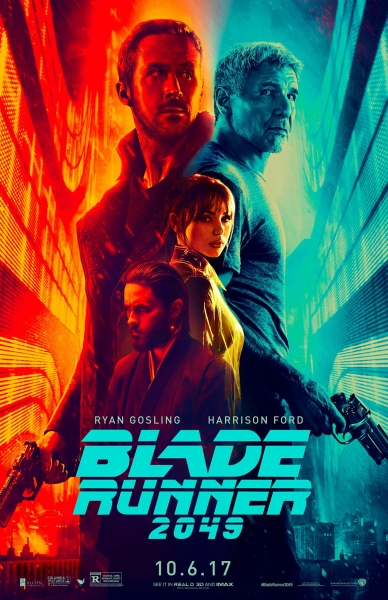Blade Runner 2049

November 27, 2017
Rating: R
Score: 9 out of 10
Blade Runner 2049 was released on October 6, 2017 and is the follow-up to the 1982 science fiction cult classic, Blade Runner. Blade Runner 2049 received universal acclaim from critics, but failed to make a connection with audiences, making a much a lower than expected box office of $249.6 million when compared to its budget of around $185 million.
2049 follows Officer K (Ryan Gosling), a replicant andorid who much like Officer Deckard (Harrison Ford) of the original movie, hunts down rogue and older models of replicants. K makes a startling discovery when he finds evidence of a pregnant replicant, and is soon tasked by his commanders to hide any evidence of a naturally conceived replicant child. K soon finds himself in competition with Niander Wallace (Jared Leto), the ruthless head of a replicant producing organization and his assassin assistant Luv (Sylvia Hoeks), who both want the secrets of the replicant child for themselves. K, along with his artificial intelligence girlfriend, Joi (Ana de Armas) embark on a journey that will leave K question everything he knows about the society he lives in, as well as his very own past.
2049 is beautiful. There’s no other way to say that. It’s just plain beautiful. Every scene is stunning, with each image more alluring than the next. Stills from this movie deserve to be put up in an art museum. Colors are exquisitely used in the film, with the drab darkness of LA being offset by the bright vibrancy of new technology, and the orange skies of Las Vegas drowning out all other colors, muting any statues and buildings, showcasing how much of a wasteland the city now is in the film. The tones and moods of scenes are instantly set the second they begin, thanks to a fantastic score, as well as cinematographer, Roger Deakins who crafts haunting and delightful moments through his control of light, dark, and everything in-between. It will be an absolute crime if Deakins doesn’t take home the Oscar for Best Cinematography come March 2018.
The film’s story is as striking as its appearance however, with 2049 telling an intelligent and tense neo-noir Sci-Fi film with a great mystery. The plot is rich and full, making you think every step of the way, while also being told so perfectly that you won’t lose sight of what’s important. The secrets of the replicant child are really what drive the film, with the mystery to this story weaving in so many enthralling twist and turns that keep you on the edge of your seat the entire time. The wonderful mystery element, and unflinchingly brutal fight scenes are accompanied by an equally important sense of poignancy, with 2049 constructing brilliant and deep analyses of the mistreatment of lower classes of people due to the nature of their birth, as well as how technology is driving society to become colder and more ruthless as it continually grows and advances.
Speaking of cold and ruthless, if I had any huge faults in Blade Runner 2049, it was the complete lack of utilization of Leto’s Niander Wallace. Every actor does a stellar job in their roles, especially Gosling as the captivating lead, and Ford returning to form as Deckard. The true show stealer for me however is Jared Leto. He has impressed me in every role he’s in, and that continued here. He’s phenomenal at playing the sadistic, merciless CEO of the Wallace Corporation. His soft spoken words contrasted by his callous, unrestrained actions, he is a complete sociopath that leaves you no clue to how he is going to act next. That’s why I find his treatment so disappointing. While his introduction scene is delightful and excellently establishes him and what he is about, everything after leaves a lot to be desired. He is used sparsely throughout the film, with Luv doing most of the heavy lifting, and Wallace disappears altogether by the film’s climax, disappointingly leaving his character without a proper conclusion. While this most likely setting up grounds for more Blade runner sequels, future installments of the series look very unlikely after the hugely disappointing box office numbers it brought in. Looks like we won’t get a proper goodbye to one of the most intriguing movie villains in recent memory.
While Leto’s Wallace suffered, Ford’s Deckard was given justice on the screen. Instead of being used for mere nostalgia purposes, Deckard is brought back as a central part to the story and Ford absolutely nails it here. He never loses sight of the tough, coolness the original Deckard had, while still exhibiting how desperate and somewhat broken the former Blade Runner has become in his old age. He is completely and utterly compelling.
Deckard is just one of the many elements that contribute to a film that despite its brutal action and dreary, dystopian world, still has a large sentimental, emotional core. K’s relationship with Joi contributes to that as well. It’s a great look at how murky the future of dating an A.I. could possibly be, and whether you’re ever truly capable of loving them like a person. This subplot adds a whole new depth to Gosling’s K, and makes you wonder how much K actually values himself as a being, whether he truly sees himself as merely a piece of machinery, or as a human person instead. Sadly, just like Wallace, the treatment of this idea of A.I. dating isn’t fully explored despite the amount of time dedicated to it, making you wonder how much deeper the makers of this film could have dug.
While the film’s misuse of Leto is disheartening, and it leaves several of its futuristic ideas (such as Joi) somewhat half-baked and unexplored, it more than makes up for it all by being an extremely well shot masterpiece that features heart pounding action sequences, a fascinating setting, a thrilling mystery, and a terrific cast that all deliver in their roles. This is easily one of my favorite films of 2017 and I’m just honestly disappointed in today’s society that this movie made as little money as it did. It should be seen by everyone.

